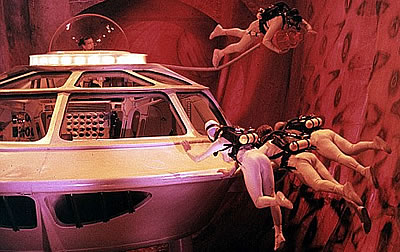Science Fiction
Dictionary
A B C D E F G H I J K L M N O P Q R S T U V W X Y Z
Proteus Microrobot Video: A Fantastic Voyage

A microrobot able to swim freely in the human bloodstream has been named the Proteus by its creators, after the 1966 film Fantastic Voyage. Take a look at this microrobot video detailing the capabilities of the real-life Proteus, as wide as two human hairs.
('Proteus' microrobot video)
The device uses a tiny tail modeled after bacteria for movement; it is controlled from outside the body. It's piezoelectric motor can actually power the device through human blood. Technovelgy readers are already familiar with this research; see the 2006 article Microrobot To Swim Like Bacteria With Flagellar Propeller for more details and pictures of Dr. Friend and his microrobots.
As Professor Friend explains, "Opportunities for micro-motors abound in fields as diverse as biomedicine, electronics, aeronautics and the automotive industry. Responses to this need have been just as diverse, with designs developed using electromagnetic, electrostatic, thermal and osmotic driving forces. Piezoelectric designs however have favourable scaling characteristics and, in general, are simple designs, which have provided an excellent platform for the development of micro-motors."
Although the new Proteus will not have miniature human passengers, the designers of the device, led by Dr. James Friend, from the Nanophysics Laboratory at Monash University, Australia, hope that it can perform a variety of life-saving functions within the human body.

(Proteus from Fantastic Voyage)
Via AFP.
Scroll down for more stories in the same category. (Story submitted 1/20/2009)
Follow this kind of news @Technovelgy.| Email | RSS | Blog It | Stumble | del.icio.us | Digg | Reddit |
Would
you like to contribute a story tip?
It's easy:
Get the URL of the story, and the related sf author, and add
it here.
Comment/Join discussion ( 0 )
Related News Stories - (" Medical ")
Bone-Building Drug Evenity Approved
'Compounds devised by the biochemists for the rapid building of bone...' - Edmond Hamilton, 1932.
BrainBridge Concept Transplant Of Human Head Proposed
'Briquet’s head seemed to think that to find and attach a new body to her head was as easy as to fit and sew a new dress.' - Alexander Belaev (1925)
Natural Gait With Prosthetic Connected To Nervous System
'The leg was to function, in a way, as a servo-mechanism operated by Larry’s brain...' - Charles Recour, 1949.
Brain Implant Is Able To Capture Your Inner Dialogue
'So you see, you can hide nothing from me.'
Technovelgy (that's tech-novel-gee!) is devoted to the creative science inventions and ideas of sf authors. Look for the Invention Category that interests you, the Glossary, the Invention Timeline, or see what's New.
Science Fiction
Timeline
1600-1899
1900-1939
1940's 1950's
1960's 1970's
1980's 1990's
2000's 2010's
Current News
The New Habitable Zones Include Asimov's Ribbon Worlds
'...there's a narrow belt where the climate is moderate.'
Can One Robot Do Many Tasks?
'... with the Master-operator all you have to do is push one! A remarkable achievement!'
Atlas Robot Makes Uncomfortable Movements
'Not like me. A T-1000, advanced prototype. A mimetic poly-alloy. Liquid metal.'
Boring Company Drills Asimov's Single Vehicle Tunnels
'It was riddled with holes that were the mouths of tunnels.'
Humanoid Robots Tickle The Ivories
'The massive feet working the pedals, arms and hands flashing and glinting...'
A Remarkable Coincidence
'There is a philosophical problem of some difficulty here...'
Cortex 1 - Today A Warehouse, Tomorrow A Calculator Planet
'There were cubic miles of it, and it glistened like a silvery Christmas tree...'
Perching Ambush Drones
'On the chest of drawers something was perched.'
Leader-Follower Autonomous Vehicle Technology
'Jason had been guiding the caravan of cars as usual...'
Golf Ball Test Robot Wears Them Out
"The robot solemnly hit a ball against the wall, picked it up and teed it, hit it again, over and again...'
Boring Company Vegas Loop Like Asimov Said
'There was a wall ahead... It was riddled with holes that were the mouths of tunnels.'
Rigid Metallic Clothing From Science Fiction To You
'...support the interior human structure against Jupiter’s pull.'
Is The Seattle Ultrasonics C-200 A Heinlein Vibroblade?
'It ain't a vibroblade. It's steel. Messy.'
Roborock Saros Z70 Is A Robot Vacuum With An Arm
'Anything larger than a BB shot it picked up and placed in a tray...'
A Beautiful Visualization Of Compact Food
'The German chemists have discovered how to supply the needed elements in compact, undiluted form...'
Bone-Building Drug Evenity Approved
'Compounds devised by the biochemists for the rapid building of bone...'
